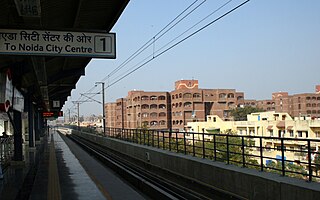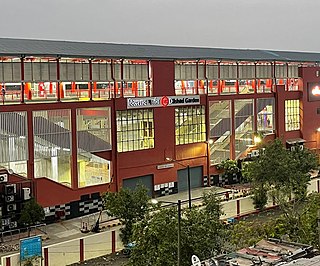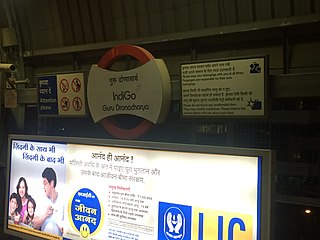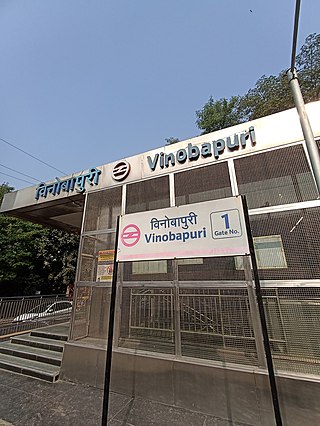Related Research Articles

Mayur Vihar is an upmarket residential area on the periphery of Delhi, located in East Delhi, close to the city's Noida-Delhi border, situated just across the Yamuna River, and is divided into three distinct phases (sectors). As the name suggests, it has been the dwelling (vihar) of peacocks (mayur). Even today, the area has a closed sanctuary dedicated to the conservation of peacocks.

The Blue Line is a rapid transit metro line of the Delhi Metro in Delhi, India. Predominantly elevated, it is the longest line on the network and consists of a Main Line(Line 3) with 50 stations from Noida Electronic City to Dwarka Sector 21, spanning a length of 56.11 kilometres, and a Branch Line(Line 4) consisting of 8 stations from Vaishali to Yamuna Bank, with a length of 8.51 kilometres.
Karawal Nagar is a census town in North East Delhi, India.
The Western Peripheral Expressway (WPE) or Kundli–Manesar–Palwal Expressway, is an operational 6-lane, 135.6 km (84.3 mi)-long Expressway in the Haryana state of India. Along with the Eastern Peripheral Expressway, the Western Peripheral Expressway is expected to divert more than 50,000 heavy vehicles away from Delhi, which will help to maintain good air quality in Delhi. Western Peripheral Expressway along with Eastern Peripheral Expressway completes the largest Ring Road around Delhi. There are 10 tolled entries and exits, from north to south - Kundli, Kharkhoda, Bahadurgarh, Badli, Fartukhnagar, Panchgaon, Manesar, Taoru, Sohna & Palwal. Toll rate notified in December 2018 is INR1.35 per km for cars, INR2.18 per km for light motor vehicles, INR4.98 per km for trucks and buses, and two wheelers are not permitted on the expressway.
Vasundhara Enclave is a posh residential area located in East Delhi. The adjoining areas include Dallupura, Mayur Vihar, New Kondli and New Ashok Nagar. Vasundhara Enclave has about forty-four apartments.

Gandhi Nagar is a residential area in the East Delhi district of Delhi in the Trans-Yamuna area. It is most known for Gandhi Nagar Market, which is Asia's biggest readymade garments/textile market. Gandhi Nagar has many shops and factories.
Laxmi Nagar, is the central location and focal point for east Delhi area. Earlier, it was one of the most inhabited cities, known as Trans Yammuna. It has become a popular shopping area for garments, and day to day staple items.

The Dilshad Garden metro station is a station of the Red Line of the Delhi Metro. It was the terminal station of the Red Line till 7 March 2019.

The Mayur Vihar Phase-1 metro station serves as an interchange station between the Blue Line and the Pink Line of Delhi Metro. This station, located in East Delhi, connects the Mayur Vihar area and is within walking distance of Mayur Vihar Pocket-I and Pocket-IV.

Anand Vihar is an interchange metro station located on the Blue and Pink lines of the Delhi Metro. Anand Vihar served as the terminus of the Blue line until July 13, 2011. The station is situated in the locality of Anand Vihar, near the interstate border between Delhi and Uttar Pradesh, and functions as a major connectivity hub for East Delhi. It is seamlessly integrated with the Anand Vihar ISBT and the Anand Vihar Terminal of Indian Railways. The upcoming RapidX station at Anand Vihar will further enhance connectivity, providing faster transit options to neighbouring cities and boosting intermodal transportation links in the region.

The Guru Dronacharya metro station is located on the Yellow Line of the Delhi Metro. It is the First Metro Station in Gurugram, in the state of Haryana.

Govindpuri is a Delhi Metro station in Delhi. It is located between Kalkaji Mandir and Harkesh Nagar Okhla stations on the Violet Line. The station was opened with the first section of the Line on 3 October 2010, in time for the Commonwealth Games opening ceremony on the same day.

The Delhi Metro is a rapid transit system that serves Delhi and the adjoining satellite cities of Ghaziabad, Faridabad, Gurugram, Noida, Bahadurgarh, and Ballabhgarh in the National Capital Region of India. The system consists of 10 colour-coded lines serving 256 stations, with a total length of 350.42 kilometres (217.74 mi). It is India's largest and busiest metro rail system and the second-oldest, after the Kolkata Metro. The metro has a mix of underground, at-grade, and elevated stations using broad-gauge and standard-gauge tracks. The metro makes over 4,300 trips daily.
Mayur Vihar Phase-3 is the third phase of the Mayur Vihar residential area in East Delhi. It lies in Kondli constituency close to the Noida border on one side and New Kondli and Gharoli on the other. It lies adjacent to Vasundhara Enclave, another prominent residential area of East Delhi. It lies on the eastern border of Delhi and shares Border of Uttar Pradesh with Noida as well as Khora Colony, a cluster of urban settlements bordering Ghaziabad. The Pincode of this area is 110096.

The Pink Line is a metro rail line of the Delhi Metro, a rapid transit system in Delhi, India. It consists of 38 metro stations from Majlis Park to Shiv Vihar, both in North Delhi.

The Bhikaji Cama Place metro station is located on the Pink Line of the Delhi Metro. The station was opened on 6 August 2018. Bhikaji Cama Place Metro Station is situated on the Ring Road. It is named after Bhikaji Cama, an Indian freedom fighter, who is credited with creating an early version of the Flag of India based on the Calcutta Flag.

The Vinobapuri metro station is located on the Pink Line of the Delhi Metro. The station was opened for public on 31 December 2018.

The Mayur Vihar-II metro station is located on the Pink Line of the Delhi Metro.
References
- ↑ "East Delhi Top 10 school, 2012". The Hindustand Times. 13 September 2012. Retrieved 25 June 2017.
- ↑ "Govt Of Delhi Notification" (PDF). Delhi.Govt.in. Retrieved 25 June 2017.
- ↑ "Decoration by Salwan public school children on Metro pillar". expressindia.com. 10 September 2007. Archived from the original on 14 October 2012. Retrieved 25 June 2017.
- ↑ "School Fee hike complaint with Delhi govt". indiatimes. 17 April 2016. Retrieved 25 June 2017.
- ↑ "Postalmark in honour of Late Pt. Salwanji". stampsofindia. 17 September 2011. Retrieved 25 June 2017.
- ↑ "Colourful art rally by students takes to the streets on Independence Day". India Today. 26 August 2014. Retrieved 1 January 2018.
- ↑ "Museum". www.salwangurgaon.com. Retrieved 11 July 2018.
- ↑ "Mini Zoo". www.salwangurgaon.com. Retrieved 11 July 2018.